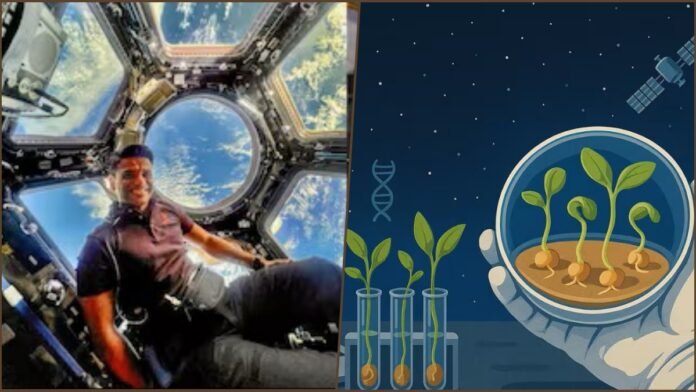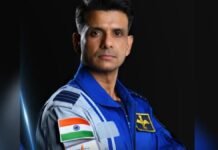
Key Points
- First-ever germination of moong and fenugreek seeds in space led by Indian astronaut Group Captain Shubhanshu Shukla on the International Space Station (ISS).
- Axiom-4 mission marks a global milestone in space agriculture, with Indian scientists at the forefront.
- Research aims to study seed development, DNA, nutrition, and microbiology under microgravity, with seeds to be regrown on Earth for further analysis.
- Innovative experiments with microalgae may pave the way for sustainable food, oxygen, and biofuel production in space.
- Additional research on stem cells and mental fatigue positions India as a rising leader in space life sciences.
New Delhi: In a landmark achievement for Indian science and global space research, Group Captain Shubhanshu Shukla has successfully germinated moong (mung bean) and fenugreek seeds aboard the International Space Station. This pioneering experiment, conducted as part of the Axiom-4 mission, is being hailed as a breakthrough in the quest for sustainable agriculture beyond Earth.
Sowing Seeds in Space: The Axiom-4 Mission
During his 12-day stay on the ISS, Captain Shukla carefully sowed moong and fenugreek seeds in petri dishes. He meticulously documented their germination through photographs and preserved the samples in a specialized freezer for return to Earth. The primary focus of the study is to observe how seeds sprout and develop in microgravity, providing crucial insights into plant biology in space conditions.
Pride and Purpose: Indian Scientists Lead the Way
Speaking with Axiom Space’s Chief Scientist Lucy Lo, Captain Shukla expressed immense pride in representing India and collaborating with ISRO and leading scientists across the nation. The experiment was designed and supervised by Dr. Ravikumar Hosamani (University of Agricultural Sciences, Dharwad) and Dr. Sudhir Siddapureddy (IIT Dharwad). Once the seeds return to Earth, they will be cultivated over multiple generations to analyze the lasting effects of space exposure on their DNA, nutritional value, and microbiological properties.
The Next Frontier: Microalgae and Crop Genetics
Beyond traditional crops, Shukla’s mission includes groundbreaking work on microalgae—organisms that could one day supply food, oxygen, and even biofuel for long-duration space missions. He also captured detailed images of six different crop seeds, aiming to identify genetic traits that enhance plant resilience and productivity in extraterrestrial environments.
Expanding Horizons: Stem Cells and Mental Health Research
Captain Shukla’s scientific agenda is not limited to agriculture. He has conducted advanced experiments on stem cells, exploring whether special supplements can accelerate their growth or aid recovery a potential game-changer for astronaut health. Additionally, he is investigating the effects of microgravity and prolonged screen exposure on mental fatigue, working inside a glove box to ensure safety and precision.
A New Era for India’s Space Ambitions
Shubhanshu Shukla’s mission represents more than a personal achievement; it signals a transformative shift in India’s space policy. The nation is rapidly evolving from a launch provider to a leader in space life sciences, biotechnology, and sustainable agriculture. These advances promise to shape the future of human space exploration and secure India’s place at the forefront of global scientific innovation.

















































